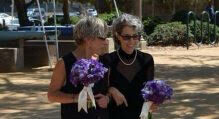Eleven years ago, my wife and I had the rug pulled out from under us. Michelle was diagnosed with ovarian cancer, and we were thrust into a new, alien world—Michelle as patient, and me as caregiver—a role I frankly wasn’t well suited for. We were forced to navigate our new reality while we were still in shock over the diagnosis, and unfortunately we found very little help. Ovarian cancer is rare enough that it is too often eclipsed by other forms of cancer, and there were few resources available to us. We found support groups for cancer generally, but not for the unique challenges that ovarian cancer patients and their caregivers face. When I finally did find a couple of appropriate caregiver support groups, they proved too far to drive to during rush hour, when the groups were scheduled.
I’m really into health, and through a local cancer support center, I volunteered to walk and talk with cancer patients who wanted company and exercise. I enjoyed it a great deal and met some wonderful people. It helped me as well because it was something I could do.
Michelle’s frontline treatment was brutal, but it worked—her cancer went in remission, and we got on with our lives. So you can imagine our devastation when Michelle’s cancer returned six years later. I was so shattered that couldn’t bring myself to continue walking with the cancer patients anymore. But I was also determined to put all the energy I could into supporting Michelle and finding both of us the help we needed.
I’m the type of person who doesn’t take no for an answer. I always do research on different treatments and options, and I’m a firm believer in second and even third opinions. Michelle proved severely allergic to the treatment that had worked six years before, so that was out. Her next treatment worked for a while and she went into remission for a short time, but the cancer returned, so her doctors spent the following year trying different drug combinations. After they had gone through every option, and nothing worked, I started to look at what else was out there. I began researching clinical trials for new ovarian cancer treatments and spoke with a number of the scientists and physicians who were conducting them. I learned everything I could about their work and how it might help Michelle. That’s also when I found out about tumor profiling, which analyzes the molecular characteristics of individual tumors. Michelle has been in a clinical trial since June 2019 that has kept her stable. But the trial is ending, so before long, we’ll again be facing the challenge of finding a new clinical trial for her.
This time, though, we won’t be on our own. Some time ago, Michelle was changing therapists and through him, Michelle and I learned about The Clearity Foundation and their many programs for ovarian cancer patients, their families and caregivers. In addition to ovarian cancer counseling and support services, Clearity does tumor profiling and helps women find clinical trials that might help with their particular form of the disease. For people like Michelle, who are tapped out on treatments or can’t tolerate platinum, this service is a godsend. What I find most exciting, though, is that Clearity’s services are based on science, so finding new treatments or pursuing clinical trials isn’t guesswork. Plus, the organization really, truly cares about the women it serves, and its staff members bend over backwards to do everything they can to help the participants in its programs. And did I mention that all its services are free?! Knowing Clearity will be there for us moving forward gives me incredible peace of mind. And our own experience has made me more determined than ever to spread the word about Clearity so as many women as possible can get the help they need at this incredibly difficult time in their lives.


